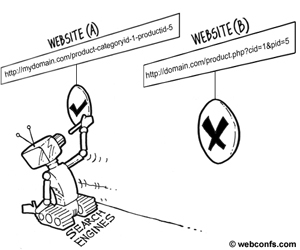Based on the previous section, you might have gotten the impression that the algorithms of search engines try to humiliate every designer effort to make a site gorgeous. Well, it has been explained why search engines do not like image, movies, applets and other extras. Now, you might think that search engines are far too cheeky to dislike dynamic URLs either. Honestly, users are also not in love with URLs like http://domain.com/product.php?cid=1&pid=5 because such URLs do not tell much about the contents of the page.
There are a couple of good reasons why static URLs score better than dynamic URLs. First, dynamic URLs are not always there – i.e. the page is generated on request after the user performs some kind of action (fills a form and submits it or performs a search using the site's search engine). In a sense, such pages are nonexistent for search engines, because they index the Web by crawling it, not by filling in forms.
 Second, even if a dynamic page has already been generated by a previous user request and is stored on the server, search engines might just skip it if it has too many question marks and other special symbols in it. Once upon a time search engines did not index dynamic pages at all, while today they do index them but generally slower than they index static pages.
Second, even if a dynamic page has already been generated by a previous user request and is stored on the server, search engines might just skip it if it has too many question marks and other special symbols in it. Once upon a time search engines did not index dynamic pages at all, while today they do index them but generally slower than they index static pages.
The idea is not to revert to static HTML only. Database-driven sites are great but it will be much better if you serve your pages to the search engines and users in a format they can easily handle. One of the solutions of the dynamic URLs problem is called URL rewriting. There are special tools (different for different platforms and servers) that rewrite URLs in a friendlier format, so they appear in the browser like normal HTML pages. Try the URL Rewriting Tool below, it will convert the cryptic text from the previous example into something more readable, like http://mydomain.com/product-categoryid-1-productid-5.
There are a couple of good reasons why static URLs score better than dynamic URLs. First, dynamic URLs are not always there – i.e. the page is generated on request after the user performs some kind of action (fills a form and submits it or performs a search using the site's search engine). In a sense, such pages are nonexistent for search engines, because they index the Web by crawling it, not by filling in forms.

The idea is not to revert to static HTML only. Database-driven sites are great but it will be much better if you serve your pages to the search engines and users in a format they can easily handle. One of the solutions of the dynamic URLs problem is called URL rewriting. There are special tools (different for different platforms and servers) that rewrite URLs in a friendlier format, so they appear in the browser like normal HTML pages. Try the URL Rewriting Tool below, it will convert the cryptic text from the previous example into something more readable, like http://mydomain.com/product-categoryid-1-productid-5.
No comments:
Post a Comment